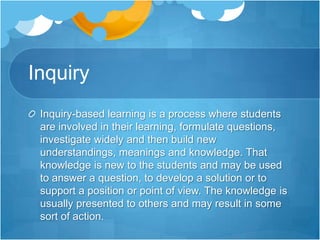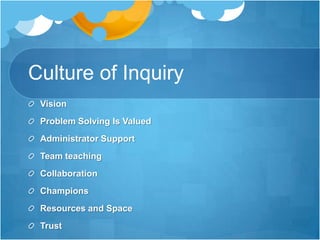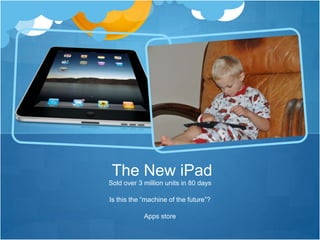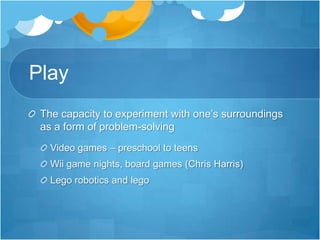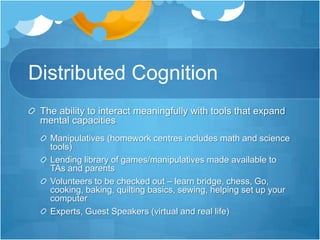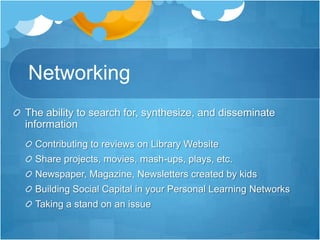NARSC2010
- 1. Inquiry, Web 2.0 and Participatory CultureJennifer Branch
- 2. InquiryInquiry-based learning is a process where students are involved in their learning, formulate questions, investigate widely and then build new understandings, meanings and knowledge. That knowledge is new to the students and may be used to answer a question, to develop a solution or to support a position or point of view. The knowledge is usually presented to others and may result in some sort of action.
- 3. Why a Modelscaffold for instructiongauge for feelingscommon language for teachers and studentsguide for studentsguide for monitoring
- 4. Culture of InquiryVisionProblem Solving Is ValuedAdministrator SupportTeam teachingCollaborationChampionsResources and SpaceTrust
- 6. Why Inquiry?
- 7. http://www.pewinternet.org/Reports/2010/Teens-and-Mobile-Phones.aspxComputers in our pockets?iPhone and iPod Touch
- 8. Sold over 3 million units in 80 daysIs this the “machine of the future”?Apps store The New iPad
- 9. Confronting the Challenges of Participatory Culture: Media Education for the 21st Centuryhttp://www.youtube.com/watch?v=AFCLKa0XRlwHenry Jenkins
- 10. New SkillsPlayPerformanceSimulationAppropriationMultitasking Distributed CognitionCollective IntelligenceJudgmentTransmedia NavigationNetworkingNegotiation
- 11. PlayThe capacity to experiment with one’s surroundings as a form of problem-solvingVideo games – preschool to teensWii game nights, board games (Chris Harris)Lego robotics and lego
- 12. PerformanceThe ability to adopt alternative identities for the purpose of improvisation and discoveryReader’s TheatrePlaywright workshops and visits – Playwright in ResidenceDrama groupsiMovie workshops and screening nightBasic film making skillsLoaning digital cameras and flip video cameras
- 13. SimulationThe ability to interpret and construct dynamic models of real world processesExtension of performance and playModel City Council/Local Government (Grade 6 Social Studies) and Mock ElectionsBoard Games – Chris (Risk, Pandemic, etc.)Educational games that model changes to a particular situation
- 14. AppropriationThe ability to meaningfully sample and remix media contentCopyright information – workshop on Creative CommonsWorkshop on searching Internet for copyright friendly images, music and clip artScreenings of mash-ups
- 15. MultitaskingThe ability to scan one’s environment and shift focus as needed to salient detailsInformation Literacy – helping young people find their way through the “sea of information”Back channeling in a conference – synthesizing, sharing, and questioningThe difference between being off-task and handling multiple tasks simultaneously
- 16. Distributed CognitionThe ability to interact meaningfully with tools that expand mental capacitiesManipulatives (homework centres includes math and science tools)Lending library of games/manipulatives made available to TAs and parentsVolunteers to be checked out – learn bridge, chess, Go, cooking, baking, quilting basics, sewing, helping set up your computerExperts, Guest Speakers (virtual and real life)
- 17. Collective IntelligenceThe ability to pool knowledge and compare notes with others toward a common goalBooks of the Year Awards CommitteeBook Clubs (Literature Circles)NingsCreating Content Sites about local issuesPartnering with local organizations
- 18. JudgmentThe ability to evaluate the reliability and credibility of different information sourcesCore of what teacher-librarians doLinks on website, reliability forms and checklistsUsing the Online Reference CentreInforming parents about Wikipedia – debunking the mythsSnopes.com or http://newmedialiteracies.org/
- 19. Transmedia NavigationThe ability to follow the flow of stories and information across multiple modalitiesFollow blog http://librariesandtransliteracy.wordpress.comMore about us understanding the networked information world and helping students to know when to use which kind of information
- 20. NetworkingThe ability to search for, synthesize, and disseminate informationContributing to reviews on Library WebsiteShare projects, movies, mash-ups, plays, etc. Newspaper, Magazine, Newsletters created by kidsBuilding Social Capital in your Personal Learning NetworksTaking a stand on an issue
- 21. NegotiationThe ability to travel across diverse communities, discerning and respecting multiple perspectives, and grasping and following alternative normsTopics of interest (themes/experts/games)Teens have expertise, too – ask them to come and helpCross-generational programs can break down stereotypes

